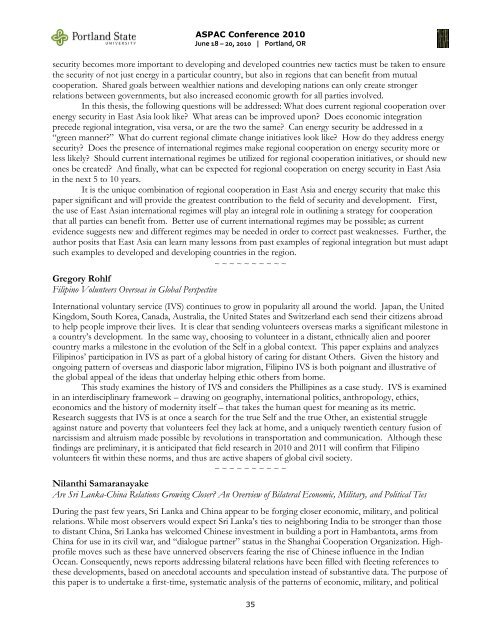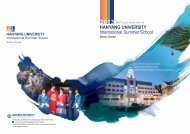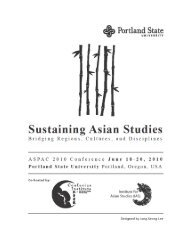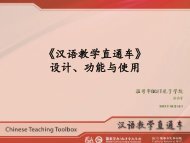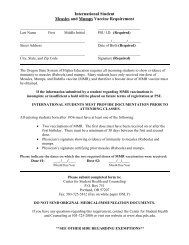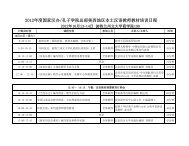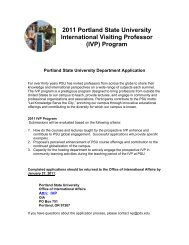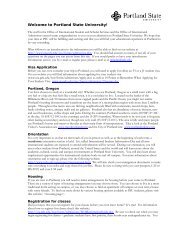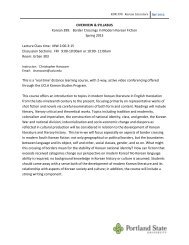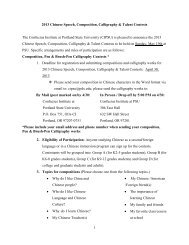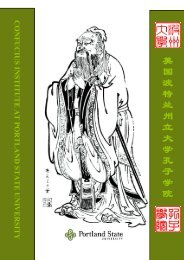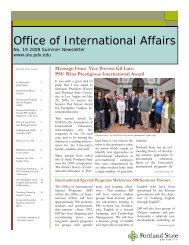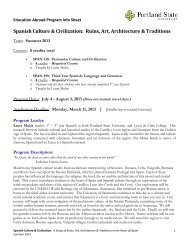ABSTRACTS - oia - Portland State University
ABSTRACTS - oia - Portland State University
ABSTRACTS - oia - Portland State University
You also want an ePaper? Increase the reach of your titles
YUMPU automatically turns print PDFs into web optimized ePapers that Google loves.
ASPAC Conference 2010<br />
June 18 – 20, 2010 | <strong>Portland</strong>, OR<br />
security becomes more important to developing and developed countries new tactics must be taken to ensure<br />
the security of not just energy in a particular country, but also in regions that can benefit from mutual<br />
cooperation. Shared goals between wealthier nations and developing nations can only create stronger<br />
relations between governments, but also increased economic growth for all parties involved.<br />
In this thesis, the following questions will be addressed: What does current regional cooperation over<br />
energy security in East Asia look like? What areas can be improved upon? Does economic integration<br />
precede regional integration, visa versa, or are the two the same? Can energy security be addressed in a<br />
“green manner?” What do current regional climate change initiatives look like? How do they address energy<br />
security? Does the presence of international regimes make regional cooperation on energy security more or<br />
less likely? Should current international regimes be utilized for regional cooperation initiatives, or should new<br />
ones be created? And finally, what can be expected for regional cooperation on energy security in East Asia<br />
in the next 5 to 10 years.<br />
It is the unique combination of regional cooperation in East Asia and energy security that make this<br />
paper significant and will provide the greatest contribution to the field of security and development. First,<br />
the use of East Asian international regimes will play an integral role in outlining a strategy for cooperation<br />
that all parties can benefit from. Better use of current international regimes may be possible; as current<br />
evidence suggests new and different regimes may be needed in order to correct past weaknesses. Further, the<br />
author posits that East Asia can learn many lessons from past examples of regional integration but must adapt<br />
such examples to developed and developing countries in the region.<br />
~ ~ ~ ~ ~ ~ ~ ~ ~ ~<br />
Gregory Rohlf<br />
Filipino Volunteers Overseas in Global Perspective<br />
International voluntary service (IVS) continues to grow in popularity all around the world. Japan, the United<br />
Kingdom, South Korea, Canada, Australia, the United <strong>State</strong>s and Switzerland each send their citizens abroad<br />
to help people improve their lives. It is clear that sending volunteers overseas marks a significant milestone in<br />
a country’s development. In the same way, choosing to volunteer in a distant, ethnically alien and poorer<br />
country marks a milestone in the evolution of the Self in a global context. This paper explains and analyzes<br />
Filipinos’ participation in IVS as part of a global history of caring for distant Others. Given the history and<br />
ongoing pattern of overseas and diasporic labor migration, Filipino IVS is both poignant and illustrative of<br />
the global appeal of the ideas that underlay helping ethic others from home.<br />
This study examines the history of IVS and considers the Phillipines as a case study. IVS is examined<br />
in an interdisciplinary framework – drawing on geography, international politics, anthropology, ethics,<br />
economics and the history of modernity itself – that takes the human quest for meaning as its metric.<br />
Research suggests that IVS is at once a search for the true Self and the true Other, an existential struggle<br />
against nature and poverty that volunteers feel they lack at home, and a uniquely twentieth century fusion of<br />
narcissism and altruism made possible by revolutions in transportation and communication. Although these<br />
findings are preliminary, it is anticipated that field research in 2010 and 2011 will confirm that Filipino<br />
volunteers fit within these norms, and thus are active shapers of global civil society.<br />
~ ~ ~ ~ ~ ~ ~ ~ ~ ~<br />
Nilanthi Samaranayake<br />
Are Sri Lanka-China Relations Growing Closer? An Overview of Bilateral Economic, Military, and Political Ties<br />
During the past few years, Sri Lanka and China appear to be forging closer economic, military, and political<br />
relations. While most observers would expect Sri Lanka’s ties to neighboring India to be stronger than those<br />
to distant China, Sri Lanka has welcomed Chinese investment in building a port in Hambantota, arms from<br />
China for use in its civil war, and “dialogue partner” status in the Shanghai Cooperation Organization. Highprofile<br />
moves such as these have unnerved observers fearing the rise of Chinese influence in the Indian<br />
Ocean. Consequently, news reports addressing bilateral relations have been filled with fleeting references to<br />
these developments, based on anecdotal accounts and speculation instead of substantive data. The purpose of<br />
this paper is to undertake a first-time, systematic analysis of the patterns of economic, military, and political<br />
35


